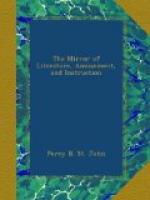During certain months of the year, tremendous hail-storms occur. They have fallen with such violence that the army has been obliged to halt, and the men being compelled to hold up their knapsacks to protect their faces, have had their hands so severely bruised and cut by large hail-stones as to bleed copiously.
Thunder-storms are also particularly severe in the elevated regions. The electric fluid is seen to fall around, in a manner unknown in other parts of the world, and frequently causes loss of life. Such storms have often burst at some distance below their feet, as the army climbed the lofty ridges of the Andes.
The distressing fatigues of the most difficult marches in Europe cannot perhaps be compared to those which the patriot soldiers underwent in the campaign of 1824. From Caxamarca (memorable for the seizure and death of Atuhualpa) to Cuzco, the whole line of the road (with the exception of the plain between Pasco and the vicinity of Tarma, twenty leagues in extent, and the valley of Xauxa) presents a continuation of rugged and fatiguing ascents and declivities. That these difficulties do not diminish between Cuzco and Potosi may be inferred from the following fact:—
When general Cordova’s division marched from Cuzco to Puno, it halted at Santa Rosa. During the night there was a heavy fall of snow. They continued their march the next morning. The effects of the rays of the sun reflected from the snow upon the eyes, produces a disease, which the Peruvians call surumpi. It occasions blindness, accompanied by excruciating pains. A pimple forms in the eye-ball, and causes an itching, pricking pain, as though needles were continually piercing it. The temporary loss of sight is occasioned by the impossibility of opening the eye-lids for a single moment, the smallest ray of light being absolutely insupportable. The only relief is a poultice of snow, but as that melts away the tortures return. With the exception of twenty men and the guides, who knew how to guard against the calamity, the whole division were struck blind three leagues distant from the nearest human habitation. The guides galloped on to a village in advance, and brought out a hundred Indians to assist in leading the men. Many of the sufferers, maddened by pain, had strayed away from the column, and perished before the return of the guides, who, together with the Indians, took charge of long files of the poor sightless soldiers, clinging to each other with agonized and desperate grasp. During their dreary march by a rugged mountain path, several fell down precipices, and were never heard of more. General Miller suffered only fifteen hours from the surumpi, but the complaint usually continues two days. Out of three thousand men, General Cordova lost above a hundred. The regiment most affected was the voltigeros (formerly Numancia), which had marched by land from Caracas, a distance of upwards of two thousand leagues.




